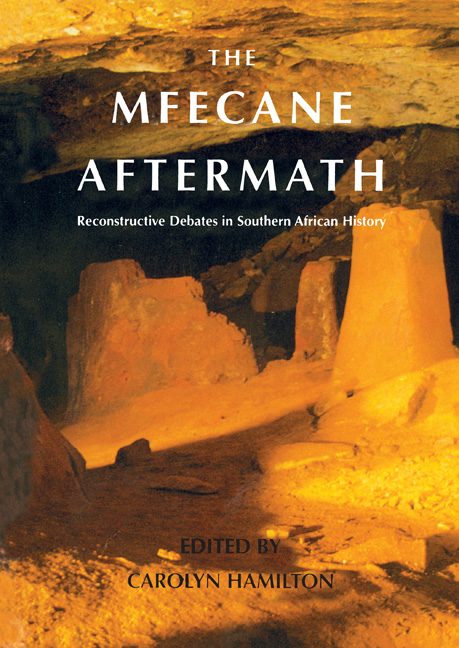Book contents
- Frontmatter
- Contents
- Maps
- Preface
- Acknowledgements
- Notes on Orthography and Names
- Contributors
- Introduction
- Part One Historiography and Methodology
- Putting the Mfecane Controversy into Historiographical Context
- 1 Pre-Cobbing Mfecane Historiography
- 2 Old Wine in New Bottles: The Persistence of Narrative Structures in the Historiography of the Mfecane and the Great Trek
- 3 Hunter-Gatherers, Traders and Slaves: The ‘Mfecane’ Impact on Bushmen, Their Ritual and Their Art
- 4 Language and Assassination: Cultural Negations in White Writers' Portrayal of Shaka and the Zulu
- Part Two The South-Eastern Coastal Region
- Part Three The Interior
- Glossary
- Abbreviations
- Bibliographer's Note
- Bibliography
- Complete List of Papers Presented at the Colloquium
- Index
1 - Pre-Cobbing Mfecane Historiography
from Part One - Historiography and Methodology
Published online by Cambridge University Press: 31 May 2019
- Frontmatter
- Contents
- Maps
- Preface
- Acknowledgements
- Notes on Orthography and Names
- Contributors
- Introduction
- Part One Historiography and Methodology
- Putting the Mfecane Controversy into Historiographical Context
- 1 Pre-Cobbing Mfecane Historiography
- 2 Old Wine in New Bottles: The Persistence of Narrative Structures in the Historiography of the Mfecane and the Great Trek
- 3 Hunter-Gatherers, Traders and Slaves: The ‘Mfecane’ Impact on Bushmen, Their Ritual and Their Art
- 4 Language and Assassination: Cultural Negations in White Writers' Portrayal of Shaka and the Zulu
- Part Two The South-Eastern Coastal Region
- Part Three The Interior
- Glossary
- Abbreviations
- Bibliographer's Note
- Bibliography
- Complete List of Papers Presented at the Colloquium
- Index
Summary
The title of Julian Cobbing's article, The Mfecane as Alibi', suggested a key part of his argument: that the view of the Mfecane held by previous historians was not only a false one, but had diverted attention from something else of greater importance. What Cobbing called in his article ‘mfecane theory’ - the idea of a great upheaval caused by the Zulu - was, he claimed, ‘integral to a white settler, “Liberal” history', and had been refined and elaborated in the 1960s. For Cobbing, settler historians, liberal historians and apartheid apologists were essentially all of one mind in believing that the Mfecane began with, or was caused by (if they confined that term to the consequences of the rise of the Zulu state), ‘a self-generated internal revolution’ in what became known as Zululand. That these ‘mfecane theorists’ all treated the Mfecane as something separate from the colonial history of South Africa was, he argued, no accident. There was, he claimed, an ideological purpose at work, in particular a concern to justify the racially unequal division of the land. What these historians had failed to point to, as the major process at work in the early nineteenth century, as later, was the violence of colonialism.
In what follows I discuss some of the earlier historical writing on the Mfecane to demonstrate that Cobbing has presented too stereotypical a view of what previous historians - hardly ‘theorists’ in any usual definition of that word - said about the Mfecane. He did not allow for the way in which views had changed over time, nor did he discuss previous work in its historical context. Historians from Theal to the liberal Africanists of the 1960s all to a greater or lesser extent saw the Zulu as playing a major role in the Mfecane, but they by no means all agreed either on its causes or its consequences. Nor did they all treat the Mfecane as something entirely separate from the history of colonisation, or ignore the violence associated with colonialism. That the liberal historians failed to give more weight to colonial violence was not because, as Cobbing suggested, they supported or were linked to segregation and apartheid, but for other reasons. And it is pointed out that the main ideas in Cobbing's anti-Mfecane critique are also to be found elsewhere.
- Type
- Chapter
- Information
- Mfecane AftermathReconstructive Debates in Southern African History, pp. 21 - 34Publisher: Wits University PressPrint publication year: 1995

